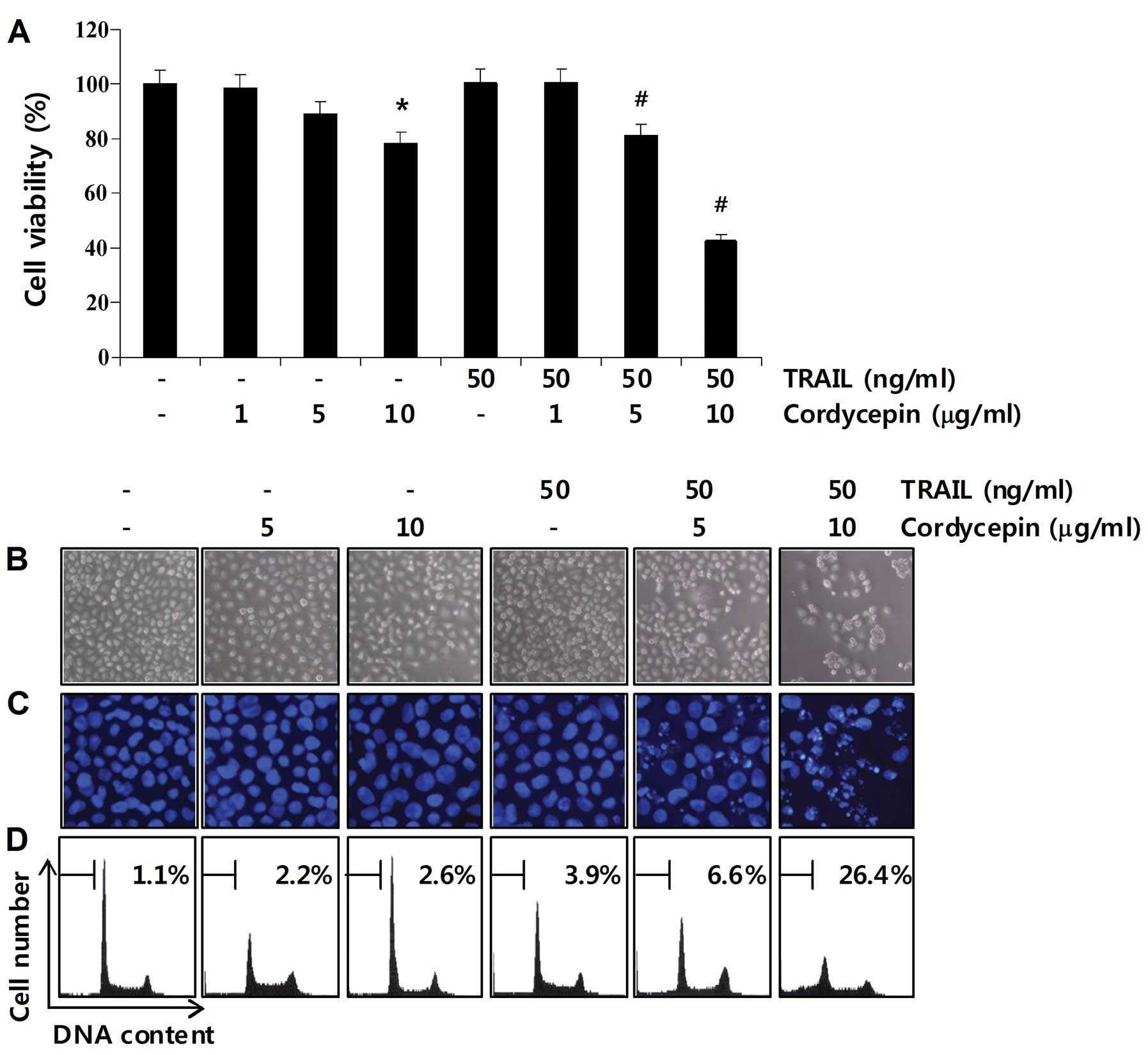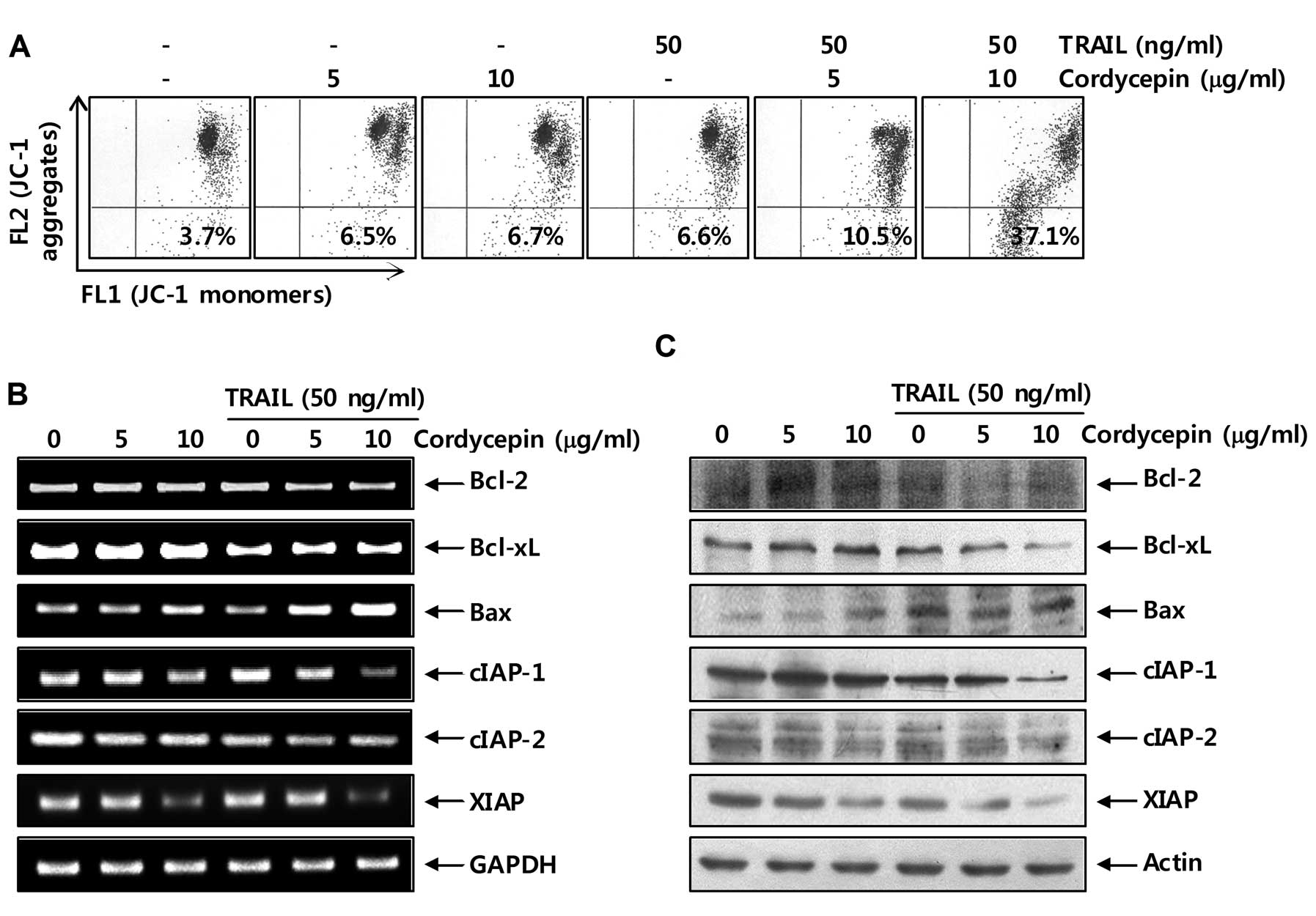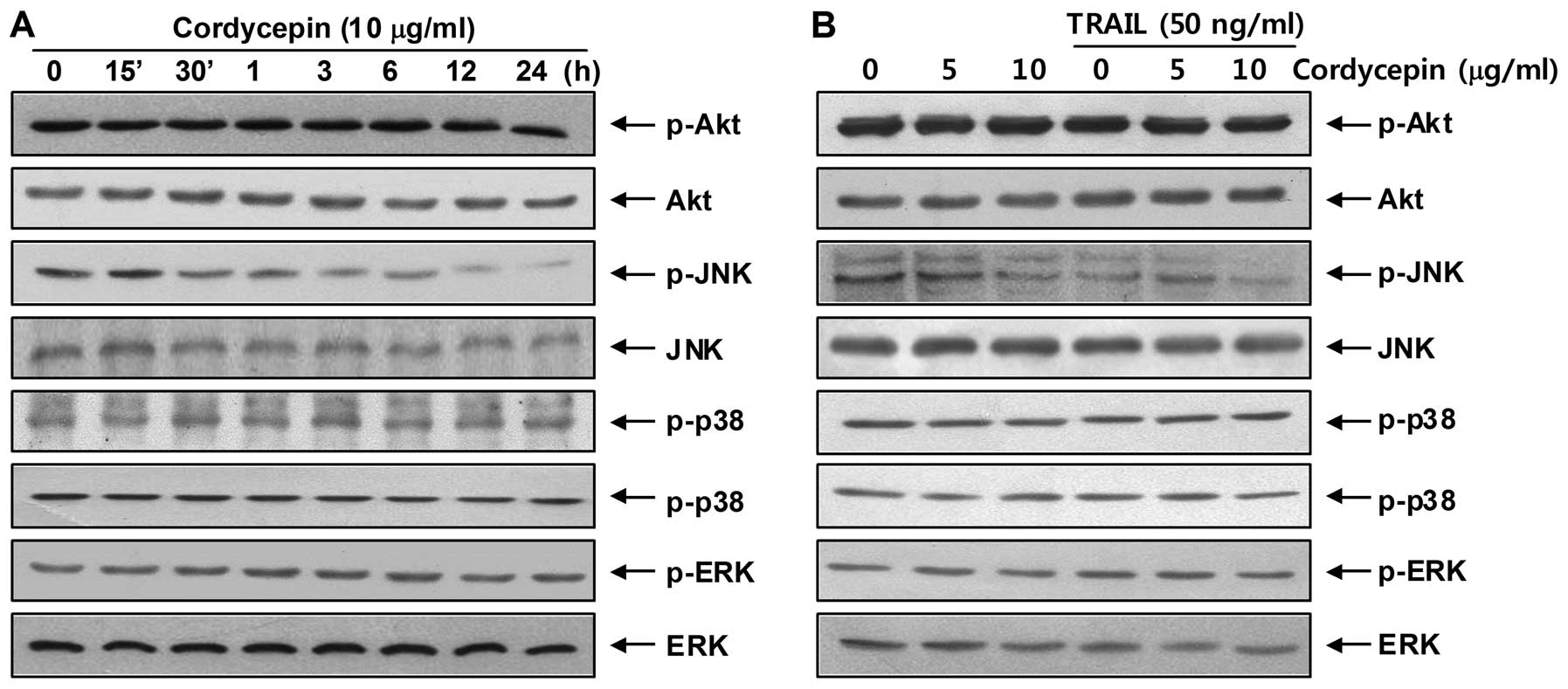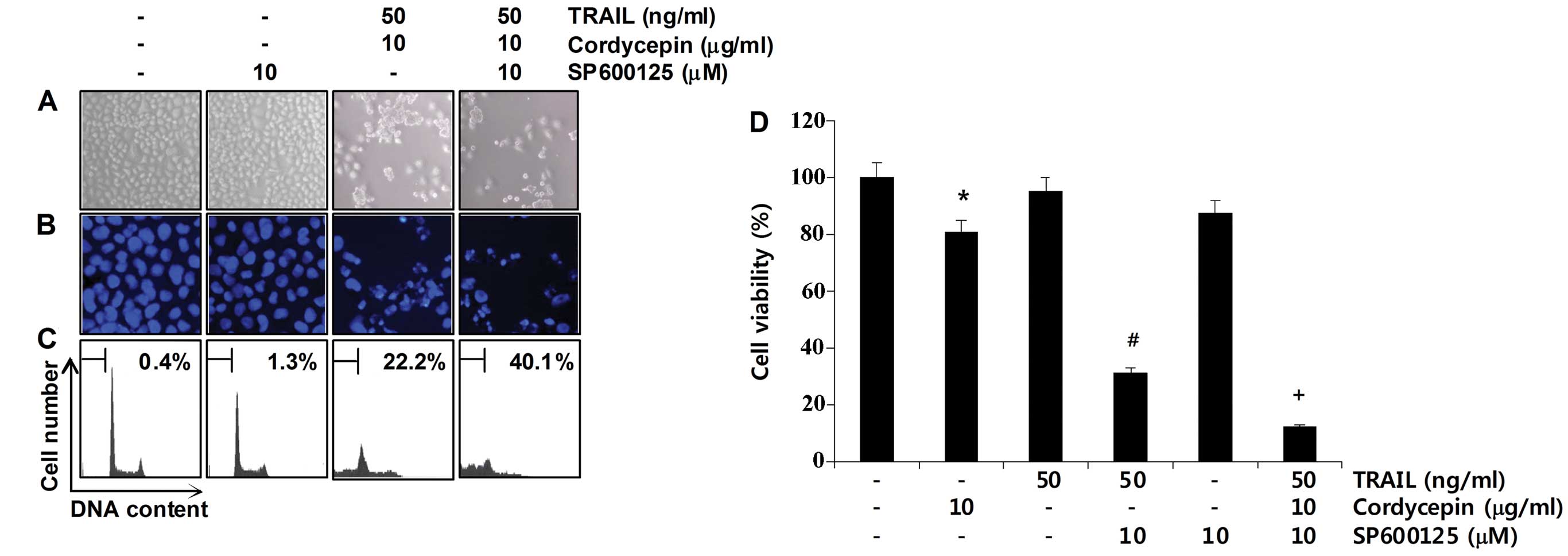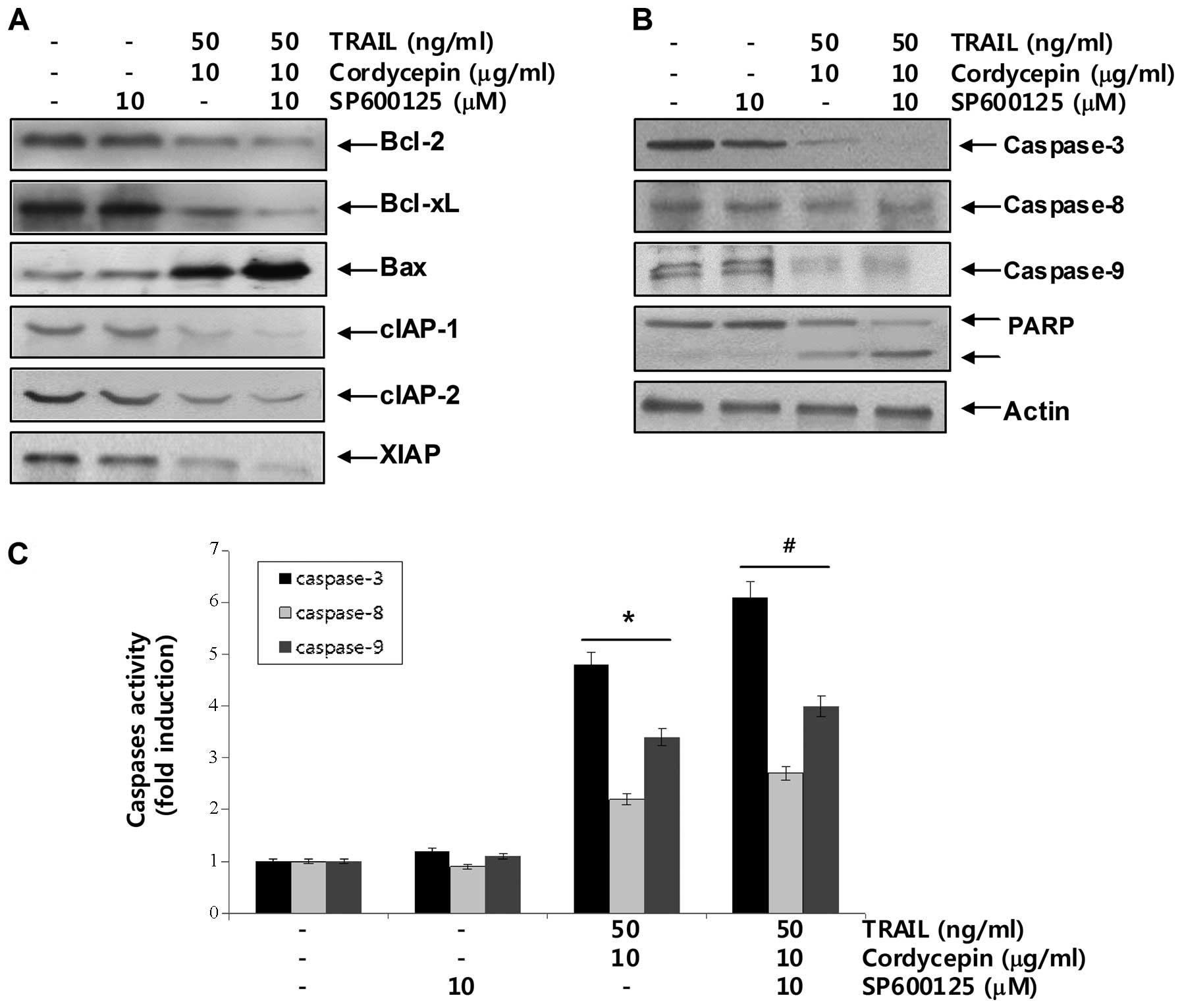|
1
|
Gruss HJ: Molecular, structural, and
biological characteristics of the tumor necrosis factor ligand
superfamily. Int J Clin Lab Res. 26:143–159. 1996. View Article : Google Scholar : PubMed/NCBI
|
|
2
|
Bonavida B, Ng CP, Jazirehi A, Schiller G
and Mizutani Y: Selectivity of TRAIL-mediated apoptosis of cancer
cells and synergy with drugs: The trail to non-toxic cancer
therapeutics (Review). Int J Oncol. 15:793–802. 1999.PubMed/NCBI
|
|
3
|
Koschny R, Ganten TM, Sykora J, Haas TL,
Sprick MR, Kolb A, Stremmel W and Walczak H: TRAIL/bortezomib
cotreatment is potentially hepatotoxic but induces cancer-specific
apoptosis within a therapeutic window. Hepatology. 45:649–658.
2007. View Article : Google Scholar : PubMed/NCBI
|
|
4
|
Secchiero P, Vaccarezza M, Gonelli A and
Zauli G: TNF-related apoptosis-inducing ligand (TRAIL): a potential
candidate for combined treatment of hematological malignancies.
Curr Pharm Des. 10:3673–3681. 2004. View Article : Google Scholar : PubMed/NCBI
|
|
5
|
Bin L, Thorburn J, Thomas LR, Clark PE,
Humphreys R and Thorburn A: Tumor-derived mutations in the TRAIL
receptor DR5 inhibit TRAIL signaling through the DR4 receptor by
competing for ligand binding. J Biol Chem. 282:28189–28194. 2007.
View Article : Google Scholar : PubMed/NCBI
|
|
6
|
Lee SH, Shin MS, Kim HS, Lee HK, Park WS,
Kim SY, Lee JH, Han SY, Park JY, Oh RR, Kang CS, Kim KM, Jang JJ,
Nam SW, Lee JY and Yoo NJ: Somatic mutations of TRAIL-receptor 1
and TRAIL-receptor 2 genes in non-Hodgkin’s lymphoma. Oncogene.
20:399–403. 2001.PubMed/NCBI
|
|
7
|
Ito Y, Arita M, Adachi K, Shibata T, Sawai
H and Ohno M: Chirally selective synthesis of sugar moiety of
nucleosides by chemicoenzymatic approach: L- and D-riboses,
showdomycin, and cordycepin. Nucleic Acids Symp Ser. 10:45–48.
1981.PubMed/NCBI
|
|
8
|
Westhof E, Plach H, Cuno I and Lüdemann
HD: Proton magnetic resonance studies of 2′-,3′-, and
5′-deoxyadenosine conformations in solution. Nucleic Acids Res.
4:939–953. 1977.
|
|
9
|
Horowitz B, Goldfinger BA and Marmur J:
Effect of cordycepin triphosphate on the nuclear DNA-dependent RNA
polymerases and poly(A) polymerase from the yeast, Saccharomyces
cerevisiae. Arch Biochem Biophys. 172:143–148. 1976. View Article : Google Scholar : PubMed/NCBI
|
|
10
|
Müller WE, Weiler BE, Charubala R,
Pfleiderer W, Leserman L, Sobol RW, Suhadolnik RJ and Schröder HC:
Cordycepin analogues of 2′,5′-oligoadenylate inhibit human
immunodeficiency virus infection via inhibition of reverse
transcriptase. Biochemistry. 30:2027–2033. 1991.
|
|
11
|
Chen Y, Chen YC, Lin YT, Huang SH and Wang
SM: Cordycepin induces apoptosis of CGTH W-2 thyroid carcinoma
cells through the calcium-calpain-caspase 7-PARP pathway. J Agric
Food Chem. 58:11645–11652. 2010. View Article : Google Scholar : PubMed/NCBI
|
|
12
|
Lee HH, Park C, Jeong JW, Kim MJ, Seo MJ,
Kang BW, Park JU, Kim GY, Choi BT, Choi YH and Jeong YK: Apoptosis
induction of human prostate carcinoma cells by cordycepin through
reactive oxygen species-mediated mitochondrial death pathway. Int J
Oncol. 42:1036–1044. 2013.
|
|
13
|
Lee SJ, Moon GS, Jung KH, Kim WJ and Moon
SK: c-Jun N-terminal kinase 1 is required for cordycepin-mediated
induction of G2/M cell-cycle arrest via p21WAF1 expression in human
colon cancer cells. Food Chem Toxicol. 48:277–283. 2010. View Article : Google Scholar : PubMed/NCBI
|
|
14
|
Lee HJ, Burger P, Vogel M, Friese K and
Brüning A: The nucleoside antagonist cordycepin causes DNA double
strand breaks in breast cancer cells. Invest New Drugs.
30:1917–1925. 2012. View Article : Google Scholar : PubMed/NCBI
|
|
15
|
Jeong JW, Jin CY, Park C, Hong SH, Kim GY,
Jeong YK, Lee JD, Yoo YH and Choi YH: Induction of apoptosis by
cordycepin via reactive oxygen species generation in human leukemia
cells. Toxicol In Vitro. 25:817–824. 2011. View Article : Google Scholar : PubMed/NCBI
|
|
16
|
Won SY and Park EH: Anti-inflammatory and
related pharmacological activities of cultured mycelia and fruiting
bodies of Cordyceps militaris. J Ethnopharmacol. 96:555–561.
2005. View Article : Google Scholar : PubMed/NCBI
|
|
17
|
Nakamura K, Konoha K, Yoshikawa N,
Yamaguchi Y, Kagota S, Shinozuka K and Kunitomo M: Effect of
cordycepin (3′-deoxyadenosine) on hematogenic lung metastatic model
mice. In Vivo. 19:137–141. 2005.
|
|
18
|
Yoshikawa N, Kunitomo M, Kagota S,
Shinozuka K and Nakamura K: Inhibitory effect of cordycepin on
hematogenic metastasis of B16–F1 mouse melanoma cells accelerated
by adenosine-5′-diphosphate. Anticancer Res. 29:3857–3860.
2009.PubMed/NCBI
|
|
19
|
Lee EJ, Kim WJ and Moon SK: Cordycepin
suppresses TNF-alpha-induced invasion, migration and matrix
metalloproteinase-9 expression in human bladder cancer cells.
Phytother Res. 24:1755–1761. 2010. View
Article : Google Scholar : PubMed/NCBI
|
|
20
|
Tak JK, Lee JH and Park JW: Resveratrol
and piperine enhance radiosensitivity of tumor cells. BMB Rep.
45:242–246. 2012. View Article : Google Scholar : PubMed/NCBI
|
|
21
|
Lemasters JJ, Nieminen AL, Qian T, Trost
LC, Elmore SP, Nishimura Y, Crowe RA, Cascio WE, Bradham CA,
Brenner DA and Herman B: The mitochondrial permeability transition
in cell death: a common mechanism in necrosis, apoptosis and
autophagy. Biochim Biophys Acta. 1366:177–196. 1998. View Article : Google Scholar : PubMed/NCBI
|
|
22
|
Fernández-Luna JL: Apoptosis regulators as
targets for cancer therapy. Clin Transl Oncol. 9:555–562. 2007.
|
|
23
|
Aggarwal BB, Bhardwaj U and Takada Y:
Regulation of TRAIL-induced apoptosis by ectopic expression of
antiapoptotic factors. Vitam Horm. 67:453–483. 2004. View Article : Google Scholar : PubMed/NCBI
|
|
24
|
Wen X, Lin ZQ, Liu B and Wei YQ:
Caspase-mediated programmed cell death pathways as potential
therapeutic targets in cancer. Cell Prolif. 45:217–224. 2012.
View Article : Google Scholar : PubMed/NCBI
|
|
25
|
Patwardhan GA and Liu YY: Sphingolipids
and expression regulation of genes in cancer. Prog Lipid Res.
50:104–114. 2011. View Article : Google Scholar : PubMed/NCBI
|
|
26
|
Lazebnik YA, Kaufmann SH, Desnoyers S,
Poirier GG and Earnshaw WC: Cleavage of poly(ADP-ribose) polymerase
by a proteinase with properties like ICE. Nature. 371:346–347.
1994. View
Article : Google Scholar : PubMed/NCBI
|
|
27
|
Fukuda K: Apoptosis-associated cleavage of
β-catenin in human colon cancer and rat hepatoma cells. Int J
Biochem Cell Biol. 31:519–529. 1999.
|
|
28
|
Frese S, Pirnia F, Miescher D, Krajewski
S, Borner MM, Reed JC and Schmid RA: PG490-mediated sensitization
of lung cancer cells to Apo2L/TRAIL-induced apoptosis requires
activation of ERK2. Oncogene. 22:5427–5435. 2003. View Article : Google Scholar : PubMed/NCBI
|
|
29
|
Falschlehner C, Emmerich CH, Gerlach B and
Walczak H: TRAIL signalling: decisions between life and death. Int
J Biochem Cell Biol. 39:1462–1475. 2007. View Article : Google Scholar : PubMed/NCBI
|
|
30
|
Secchiero P, Gonelli A, Carnevale E,
Milani D, Pandolfi A, Zella D and Zauli G: TRAIL promotes the
survival and proliferation of primary human vascular endothelial
cells by activating the Akt and ERK pathways. Circulation.
107:2250–2256. 2003. View Article : Google Scholar : PubMed/NCBI
|
|
31
|
Seo OW, Kim JH, Lee KS, Lee KS, Kim JH,
Won MH, Ha KS, Kwon YG and Kim YM: Kurarinone promotes
TRAIL-induced apoptosis by inhibiting NF-κB-dependent cFLIP
expression in HeLa cells. Exp Mol Med. 44:653–664. 2012.PubMed/NCBI
|
|
32
|
Ola MS, Nawaz M and Ahsan H: Role of Bcl-2
family proteins and caspases in the regulation of apoptosis. Mol
Cell Biochem. 351:41–58. 2011. View Article : Google Scholar : PubMed/NCBI
|
|
33
|
Brenner D and Mak TW: Mitochondrial cell
death effectors. Curr Opin Cell Biol. 21:871–877. 2009. View Article : Google Scholar
|
|
34
|
Thakkar H, Chen X, Tyan F, Gim S, Robinson
H, Lee C, Pandey SK, Nwokorie C, Onwudiwe N and Srivastava RK:
Pro-survival function of Akt/protein kinase B in prostate cancer
cells. Relationship with TRAIL resistance. J Biol Chem.
276:38361–38369. 2001. View Article : Google Scholar : PubMed/NCBI
|
|
35
|
Tran SE, Holmstrom TH, Ahonen M, Kahari VM
and Eriksson JE: MAPK/ERK overrides the apoptotic signaling from
Fas, TNF, and TRAIL receptors. J Biol Chem. 276:16484–16490. 2001.
View Article : Google Scholar : PubMed/NCBI
|
|
36
|
Söderström TS, Poukkula M, Holmström TH,
Heiskanen KM and Eriksson JE: Mitogen-activated protein
kinase/extracellular signal-regulated kinase signaling in activated
T cells abrogates TRAIL-induced apoptosis upstream of the
mitochondrial amplification loop and caspase-8. J Immunol.
169:2851–2860. 2002.
|
|
37
|
Jurewicz A, Matysiak M, Andrzejak S and
Selmaj K: TRAIL-induced death of human adult oligodendrocytes is
mediated by JNK pathway. Glia. 53:158–166. 2006. View Article : Google Scholar : PubMed/NCBI
|
|
38
|
Mühlenbeck F, Haas E, Schwenzer R,
Schubert G, Grell M, Smith C, Scheurich P and Wajant H: TRAIL/Apo2L
activates c-Jun NH2-terminal kinase (JNK) via
caspase-dependent and caspase-independent pathways. J Biol Chem.
273:33091–33098. 1998.PubMed/NCBI
|
|
39
|
Qu J, Zhao M, Teng Y, Zhang Y, Hou K,
Jiang Y, Yang X, Shang H, Qu X and Liu Y: Interferon-α sensitizes
human gastric cancer cells to TRAIL-induced apoptosis via
activation of the c-CBL-dependent MAPK/ERK pathway. Cancer Biol
Ther. 12:494–502. 2011.
|
|
40
|
Gupta SC, Reuter S, Phromnoi K, Park B,
Hema PS, Nair M and Aggarwal BB: Nimbolide sensitizes human colon
cancer cells to TRAIL through reactive oxygen species- and
ERK-dependent up-regulation of death receptors, p53, and Bax. J
Biol Chem. 286:1134–1146. 2011. View Article : Google Scholar : PubMed/NCBI
|
|
41
|
Phipps LE, Hino S and Muschel RJ:
Targeting cell spreading: a method of sensitizing metastatic tumor
cells to TRAIL-induced apoptosis. Mol Cancer Res. 9:249–258. 2011.
View Article : Google Scholar : PubMed/NCBI
|















